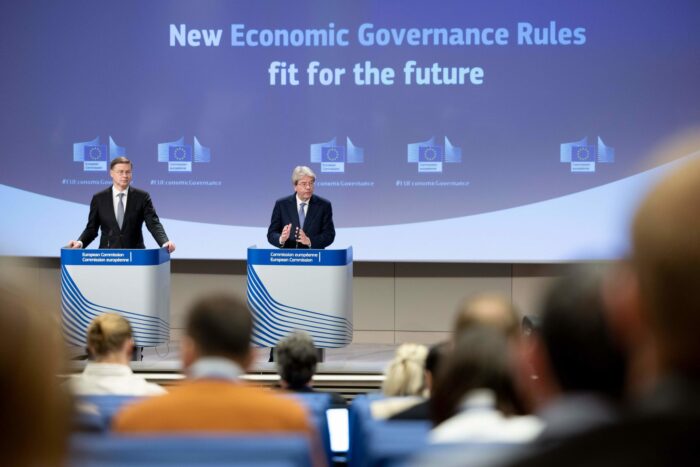The Progressive Post
Daring more democracy!


The EU’s current reform of economic policy coordination rules risks worsening rather than improving its democratic deficit. However, the proposals could still be democratised, and this would serve the EU both politically and economically.
When the French government raises the retirement age or when a new anti-child poverty allowance is cut down in Germany, EU economic governance rules play an important but often overlooked role in the background. After all, such austerity measures are not only implemented because of national considerations but also take place in the context of European debt rules. These are more than an obscure niche topic reserved for experts: they set the financial limits for member states’ political decisions and thus for democracy itself.
Restrictive fiscal rules not only legitimise antisocial policies, but they also play into the hands of authoritarian right-wing populists like Marine Le Pen in France or the AfD in Germany: it fuels their narrative of an allegedly distant and technocratic EU and allows them to present themselves as ‘social’ voices against the lack of alternatives. From a progressive point of view, greater critical attention to the current reform of economic governance in the EU is thus imperative: without important changes in this year’s reform process, democratic sovereignty over political decisions and the scope for progressive politics risk being further eroded.
The Commission’s reform proposals: a missed opportunity
For progressives, the EU Commission’s legislative package is disappointing on several counts. Particularly on investment policy, the proposals are not very ambitious. True, some innovations could increase the financial scope of member states for public investment: instead of rigid and uniform numerical rules, the EU Commission’s more flexible debt sustainability analysis will take centre stage. Therein, growth-friendly public investment should have a positive impact on the debt sustainability of the member states. Member states are also to be granted a longer debt adjustment path if they submit policy plans deemed as in line with EU priorities by the EU Commission.
Overall, however, the proposals represent a missed opportunity to confront the overdue social and ecological transformation of our economy. For example, no general exceptions to calculating permitted expenditures for decarbonising investments were included. And joint European financing of important investments was deliberately decoupled from the reform of debt rules, instead of making this a condition for more limited national spending.
Equally disappointing is the system’s proposed governance. So far, EU economic policy coordination with the European Semester at its heart is a largely untransparent, technocratic process. Both the European Parliament and national parliaments retain an observer role. The situation is no better for civil society. There are regular consultations with the social partners and other organised civil society actors, but it is unclear if and to what extent their feedback has any influence on the EU policy recommendations.
Instead, it is primarily the unelected EU Commission that drives economic policy coordination and formulates recommendations. Their adoption in the Council has largely been a formality and – in contrast to national fiscal policy – is untransparent and without formal influence for the opposition. Citizens can therefore neither assign clear responsibility for fiscal policy in the EU, nor are they shown alternatives they could vote for if they reject current policies. In other words, European economic policy is coordinated in a way that is largely beyond democratic control.
The reform’s unused chance to democratise EU economic governance
Yet, the current legislative reform could initiate a turnaround here and strengthen democratic accountability in the EU. A new study, ‘How to democratise Europe’s fiscal rules’, commissioned by the Friedrich-Ebert-Stiftung, develops legally viable proposals within the current reform process. Author Mark Dawson, a professor of EU Law and Governance at the Hertie School in Berlin, makes clear that the EU treaties do not stand in the way of democratising economic policy coordination. Indeed, the study develops concrete reform proposals aimed at strengthening the European Parliament, effectively involving national parliaments and organised civil society.
Strengthening the principle of democracy is important for at least three reasons. First, it is central to strengthening the legitimacy of political decisions at the European level. Fiscal policy is by no means a technical matter that can be negotiated exclusively in expert circles. Depending on the economic cycle, reducing debt too quickly can dampen growth and have negative social consequences. And budget consolidation has large distributional effects which create winners and losers. How to resolve these conflicts of goals and distribution cannot be left to experts alone, but must be decided by elected parliaments with the involvement of organised civil society.
Second, more democratic legitimacy could also help to improve the rules’ so far lacklustre implementation by member states. Many recommendations are not – or only partially – implemented by the member states. Only in crises, when member states’ solvency is at risk, has the Commission been able to dictate its economic policy reform agenda to member states. Yet, the eurozone crisis provides a cautionary example of this ‘success’: the social and economic costs were enormous, hurt confidence in the EU and boosted populists including those on the far-right.
Third, the democratisation of EU economic governance is necessary to properly institutionalise an explicit goal of the current reform, namely a balance between social and environmental as well as fiscal objectives. Not least because the social and environmental effects of public spending also involve fiscal costs (or benefits) for the future, the current one-sided consideration of fiscal risks alone is counterproductive. According to Dawson, formally integrating social partners and environmental institutions in addition to independent fiscal institutions in national fiscal planning could reduce this imbalance.
The necessary democratisation of EU economic governance
History shows that shielding economic decisions from citizens is not only undemocratic, but also ineffective and produces antisocial policy results. If this technocratic policy style persists, economic policy coordination in the EU risks not only overlooking workers’ interests, but also underestimating the economic and social costs of climate change. Equally, it risks further fuelling the far-right and its allegations of EU economic policy as an undemocratic straitjacket which is hurting citizens.
A critical public, institutionalised by parliamentary supervision, is therefore needed to put pressure on the EU Commission and governments to make better fiscal policy decisions. This can only be achieved if the current legislative process also significantly strengthens democracy in economic policy coordination. Ultimately, therefore, for social as well as political and economic reasons, Willy Brandt’s old slogan also applies to the current reform of European fiscal rules: daring more democracy!
Photo credits: © European Union 2023




